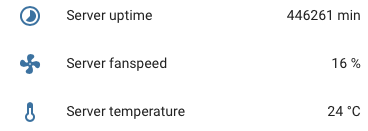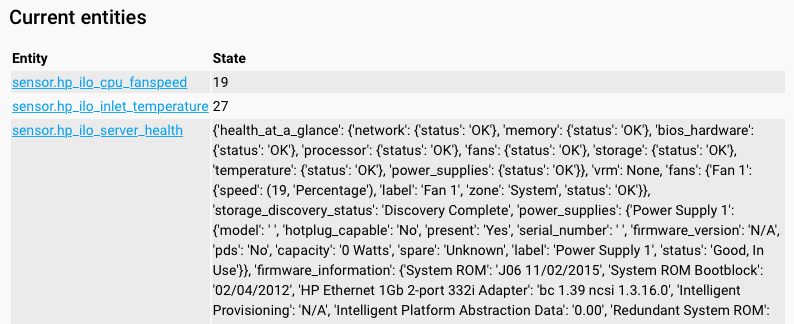HP ILO
The hp_ilo platform allows you to do an API call to the HP ILO (Integrated Lights-Out) sensor of your server, and use this data in Home Assistant sensors.
If the ILO or specified jsonpath query returns only a single value (e.g. a temperature or state), it will be put in the state field. If a data structure is returned, it will be placed in the ilo_data attribute.
Some more details about what can be retrieved from these sensors is available in the python-hpilo documentation.

To use this component in your installation, add the following to your configuration.yaml file:
# Example configuration.yaml entry
sensor:
- platform: hp_ilo
host: IP_ADDRESS or HOSTNAME
username: USERNAME
password: PASSWORD
monitored_variables:
- name: SENSOR NAME
sensor_type: SENSOR TYPE
Configuration variables:
- host (Required): The hostname or IP address on which the ILO can be reached.
- port (Optional): The port on which the ILO can be reached, defaults to port
443. - username (Required): The username used to connect to the ILO.
- password (Required): The password used to connect to the ILO.
- monitored_variables array (Optional): Sensors created from the ILO data. Defaults to an empty list (no sensors are created).
- name (Required): The sensor name.
- sensor_type (Required): The sensor type, has to be one of the specified valid sensor types.
- unit_of_measurement (Optional): The sensors’ unit of measurement.
- value_template (Optional): When a Jinja2 template is specified here, the created sensor will output the template result. The ILO response can be referenced with the
ilo_datavariable.
Valid sensor_types:
- server_name: Get the name of the server this iLO is managing.
- server_fqdn: Get the fqdn of the server this iLO is managing.
- server_host_data: Get SMBIOS records that describe the host.
- server_oa_info: Get information about the Onboard Administrator of the enclosing chassis.
- server_power_status: Whether the server is powered on or not.
- server_power_readings: Get current, min, max and average power readings.
- server_power_on_time: How many minutes ago has the server been powered on.
- server_asset_tag: Gets the server asset tag.
- server_uid_status: Get the status of the UID light.
- server_health: Get server health information.
- network_settings: Get the iLO network settings.
Example
In order to get two sensors reporting CPU fan speed and Ambient Inlet Temperature, as well as a dump of server_health on a HP Microserver Gen8, you could use the following in your configuration.yaml file
sensor:
- platform: hp_ilo
host: IP_ADDRESS or HOSTNAME
username: USERNAME
password: PASSWORD
monitored_variables:
- name: CPU fanspeed
sensor_type: server_health
unit_of_measurement: '%'
value_template: '{{ ilo_data.fans["Fan 1"].speed[0] }}'
- name: Inlet temperature
sensor_type: server_health
unit_of_measurement: '°C'
value_template: '{{ ilo_data.temperature["01-Inlet Ambient"].currentreading[0] }}'
- name: Server Health
sensor_type: server_health

Hardware specifics
Not every hardware supports all values.
HP Microserver Gen8
On this hardware you should avoid using the following sensor_types as monitored_variables: to prevent errors.
server_oa_infoserver_power_readingsserver_power_on_time